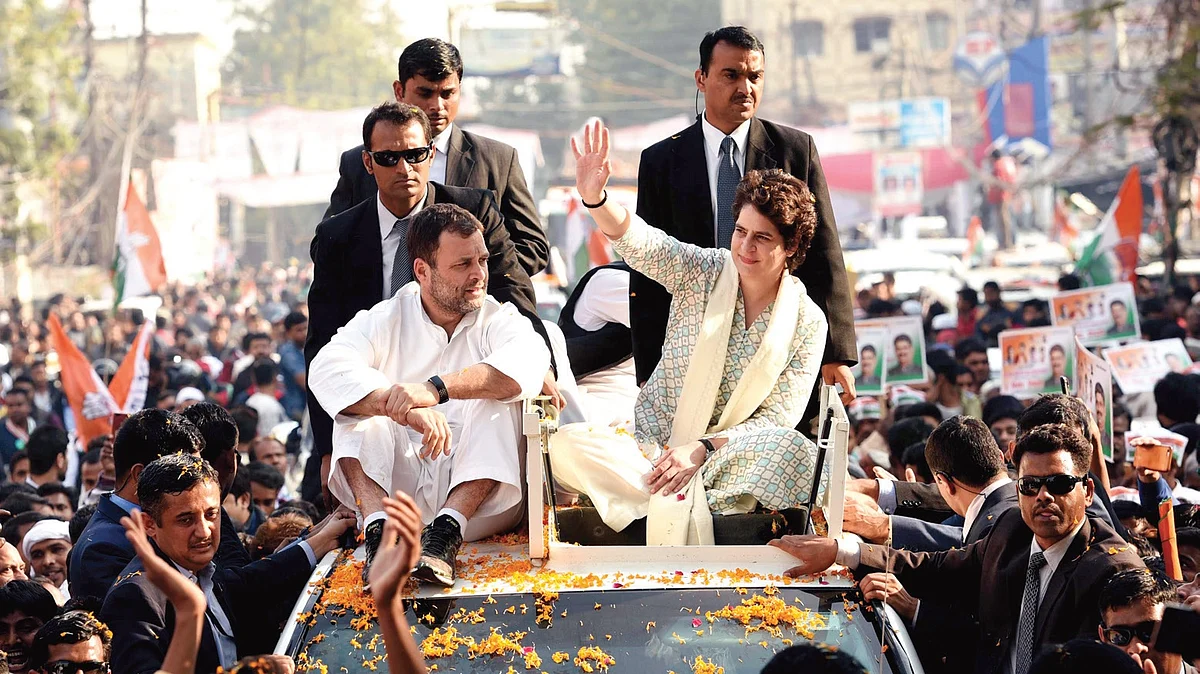Congress in Uttar Pradesh: A politics beyond caste identity
The road show in Lucknow has made one thing very clear: That Priyanka Gandhi Vadra has started her work to restore the lost ground of the Congress

Priyanka Gandhi Vadra, along with her brother Congress president Rahul Gandhi and Jyotiraditya Scindia, led a successful road show in Lucknow recently. It not only attracted Congress workers from different parts of Uttar Pradesh but scores of common people who see a new hope with the entry of Priyanka Gandhi Vadra into active politics. Youths also gathered in huge numbers to catch a glimpse of the brother-sister duo. While Priyanka did not speak, Rahul made one thing clear: That the Congress’ goal was to form the government in Uttar Pradesh. Priyanka Gandhi had sent an audio message before the road show promising a new kind of politics in Uttar Pradesh. What will be this new politics? In her own words, youths, women, the marginalised and commoners will find their aspirations echoed in that brand of politics. The road show has made one thing very clear: That Priyanka Gandhi Vadra has started her work to restore the lost ground of the Congress.
The Congress has been out of power in Uttar Pradesh for at least the last 30 years. In the 90’s only, the politics of social justice gained momentum in Uttar Pradesh. It was the phase of the coming of age of Mulayam Singh Yadav-led Samajwadi Party and Kanshi ram-Mayawati-led Bahujan Samaj Party. Ever since then, Uttar Pradesh has been ruled by identity politics stemming from the SP-BSP version of social justice politics. But what has happened in actual effect is that the social justice element has got pushed to the backburner and caste-based identity has become the dominant factor.
Few dominant castes have emerged from this politics of identity among both OBCs and Dalits and they have started cornering most of the state’s resources designed to address socio-economic inequality in the state. These dominant castes have become visible in politics and have started using state resources for personal gains. They have emerged as part of a middle class which is not paying back to the community. BR Ambedkar, during his lifetime, had observed the growth of such middle classes among backward communities and voiced his complaint against such socio-political formations. These castes eventually became dominant in parties like Samajwadi Party (SP) and Bahujan Samaj Party (BSP).
In Uttar Pradesh, out of about 65 Dalit communities, only four or five communities thus came to play a dominant political role for 30 long years. The story is the same for the OBCs. Barring a handful, most are still invisible in the political and development paradigm. Even amongst the visible communities of Dalits and OBCs, only a few select sections actually derived benefits of the development projects initiated by the state. So, this led to acute poverty and backwardness for many communities among OBCs and Dalits.
The tagline of the new kind of politics proposed by Priyanka Gandhi and articulated from time to time by Rahul Gandhi seems to be equal distribution of developmental resources to the communities who have lagged behind during the SPBSP rule. The BJP rule has only worsened the conditions of the most marginalised and invisible communities. The BJP has failed to provide any remedy. Congress’s new politics may evolve a new version of social justice who may ensure equal distribution of developmental resources to all the marginalised, Dalits, OBCs and poor sections of the society. It may eventually see poverty as a class problem rather than as a caste issue. Through constant interactions and introspection, the Congress needs to evolve its new politics that can help us fulfil the dreams of BR Ambedkar, Ram Manohar Lohia and Kanshi ram of achieving equality for the marginalised. The ultimate aim has to be the abolition of caste. This new version of social justice politics may use the insights of Mahatma Gandhi, Jawaharlal Nehru, BR Ambedkar, Ram Manohar Lohia and Kanshi Ram to usher in a new brand of politics in Uttar Pradesh.
This promise of a new brand of politics which instils hope in different sections of people may define a new trajectory of development by incorporating the desires of various sections. These desires and aspirations may find expression in a package of schemes, plans and agendas. Priyanka Gandhi’s entry into politics has raised the hope of various sections of people in Uttar Pradesh. Someone in his 70’s, in Allahabad, sees Indira Gandhi’s image in her. A youth from Phulpur says, “Unse bahut ummid hai (We have a lot of hope in her).” A young woman of Pratapgarh seems very happy that Priyanka may lead the development of Uttar Pradesh in the future. We need to see how Priyanka Gandhi Vadra rises to the occasion.
Follow us on: Facebook, Twitter, Google News, Instagram
Join our official telegram channel (@nationalherald) and stay updated with the latest headlines